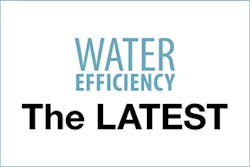Water Environment Federation Urges Congress to Fund Key Water Programs
The Water Environment Federation (WEF) is strongly urging Congress to continue federal investment in water infrastructure, geographic watershed and state grant programs, water systems security, and water research programs as it finalizes Fiscal Year 2018 spending bills.
The letter to Congress stated that support for these programs is essential to safeguarding public health, protecting the environment, promoting economic growth, and ensuring community resiliency.
Along with WEF, the letter to Congress was co-signed by the Association of Metropolitan Water Agencies, National Association Clean Water Agencies, U.S. Water Alliance, WateReuse, and Water and Wastewater Equipment Manufacturers Association.
“As WEF members and other water professionals work every day to ensure clean and reliable water in communities across America, it is vital that Congress provide the funding that supports their efforts,” said Eileen O’Neill, WEF Executive Director.
Core programs such as the Clean Water and Drinking Water State Revolving Funds (SRFs) and the new Water Infrastructure Finance & Innovation Act (WIFIA) program provide funding for critical drinking water and wastewater projects. The letter calls for Congress to at least maintain funding for the SRFs at FY17 levels. Additionally, the letter states the WIFIA program should be funded at the FY18 authorized level of $45 million, which could be leveraged into upwards of $4.5 billion in funding for water infrastructure projects.
The letter also urges Congress to:
• Provide at least $50 million for the Bureau of Reclamation’s Title XVI program, which is the only federal program that provides funding specifically for water reuse projects.
• Maintain funding for geographic watershed protection programs, such as the Great Lakes Restoration Initiative and the Chesapeake Bay Initiative, and the grant programs that support state efforts to work with utilities on water quality.
• Maintain funding for the EPA Office of Water’s Water Security Division, which provides valuable resources and support for water agencies to help them prepare for a host of natural and man-made threats that potentially could disrupt or destroy water infrastructure.
• Maintain funding for water research and technology development programs coordinated among a variety of federal agencies, including the USEPA, U.S. Geological Survey, Department of Energy, National Science Foundation, and the Bureau of Reclamation. Continued research funding is critical to the quality of life for communities across the U.S., cost-effective infrastructure repair and replacement, and the business and economic advantages it gives the nation in the global marketplace.
WEF has recently sent other letters to Congress urging that infrastructure damaged by Hurricanes Harvey, Irma, and Maria be rebuilt in a resilient manner, and that federal funding for water research be protected.
About WEF The Water Environment Federation (WEF) is a not-for-profit technical and educational organization of 34,000 individual members and 75 affiliated Member Associations representing water quality professionals around the world. Since 1928, WEF and its members have protected public health and the environment. As a global water sector leader, our mission is to connect water professionals; enrich the expertise of water professionals; increase the awareness of the impact and value of water; and provide a platform for water sector innovation. To learn more, visit www.wef.org.
